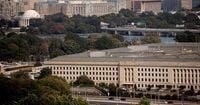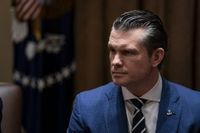On April 15, 2025, Dan Caldwell, a senior adviser to U.S. Defense Secretary Pete Hegseth, was escorted from the Pentagon and placed on administrative leave amid an investigation into unauthorized disclosures of sensitive information. This sudden action marks a significant development in the ongoing efforts by the Trump administration to clamp down on leaks within the Department of Defense.
Caldwell, a Marine Corps veteran who served in the Iraq War, has been a key figure in Hegseth's team since he took office in January 2025. His role included advising on military operations and serving as Hegseth's representative in a Signal messaging chat used by top national security officials. This chat, which became controversial when it was revealed that Jeffrey Goldberg, editor-in-chief of The Atlantic, was inadvertently added, included discussions about military plans against Houthi militants in Yemen.
The investigation into Caldwell's conduct was confirmed by multiple defense officials who spoke on the condition of anonymity. While the specifics of the alleged unauthorized disclosures remain undisclosed, sources indicate that Caldwell is accused of sharing classified documents with reporters. This allegation aligns with a broader crackdown on leaks initiated by the Pentagon, which has intensified in recent months under Hegseth's leadership.
On March 21, 2025, Hegseth's chief of staff, Joe Kasper, sent a memo outlining the need for an investigation into recent unauthorized disclosures of national security information. The memo stated that personnel could be subjected to polygraphs as part of the inquiry. "I expect to be informed immediately if this effort results in information identifying a party responsible for an unauthorized disclosure, and that such information will be referred to the appropriate criminal law enforcement entity for criminal prosecution," Kasper wrote.
Caldwell's connections to Hegseth date back to their time at Concerned Veterans for America, a nonprofit organization that faced financial difficulties under Hegseth's leadership. Caldwell's career also includes a position as a public policy adviser at Defense Priorities, a think tank known for advocating a more restrained U.S. foreign policy.
In December 2024, Caldwell expressed his critical view of the Iraq War, stating, "I think the Iraq war was a monstrous crime," a sentiment that has resonated with a faction within the Republican Party that questions U.S. military engagements abroad. His position on foreign policy has often put him at odds with traditional Republican views that emphasize military strength and intervention.
The investigation into Caldwell is part of a larger pattern of scrutiny within the Trump administration, which has been pursuing leak investigations aggressively. In fact, Caldwell's ouster coincides with the suspension of another Pentagon official, Darin Selnick, who was also placed on administrative leave amid the same probe. The leaks under investigation reportedly include sensitive operational plans related to military strategies, including a second carrier deployment to the Red Sea and discussions about pausing intelligence collection efforts in Ukraine.
As the investigation unfolds, Hegseth has publicly denied any wrongdoing related to disclosures of sensitive military information. He stated, "Nobody was texting war plans, and that's all I have to say about that," in response to allegations stemming from the Signal chat. However, several current and former military officials have suggested that the timing of attacks and operational details discussed in that chat are among the most closely guarded national security information.
The implications of Caldwell's administrative leave extend beyond individual accountability; they reflect a broader climate of fear and caution within the Pentagon regarding information sharing. The ongoing investigation has raised concerns about the culture of transparency and communication among military officials, particularly in an era where information leaks can have significant consequences for national security.
As of now, Caldwell has not publicly commented on the allegations against him, and Pentagon officials have declined to provide further details regarding the investigation. The situation remains fluid, with many in Washington closely monitoring the developments as they unfold.
In summary, Dan Caldwell's abrupt removal from the Pentagon highlights the Trump administration's intensified efforts to address leaks of sensitive information within the Department of Defense. As investigations continue, Caldwell's future and the implications for military operations and communications remain uncertain.










